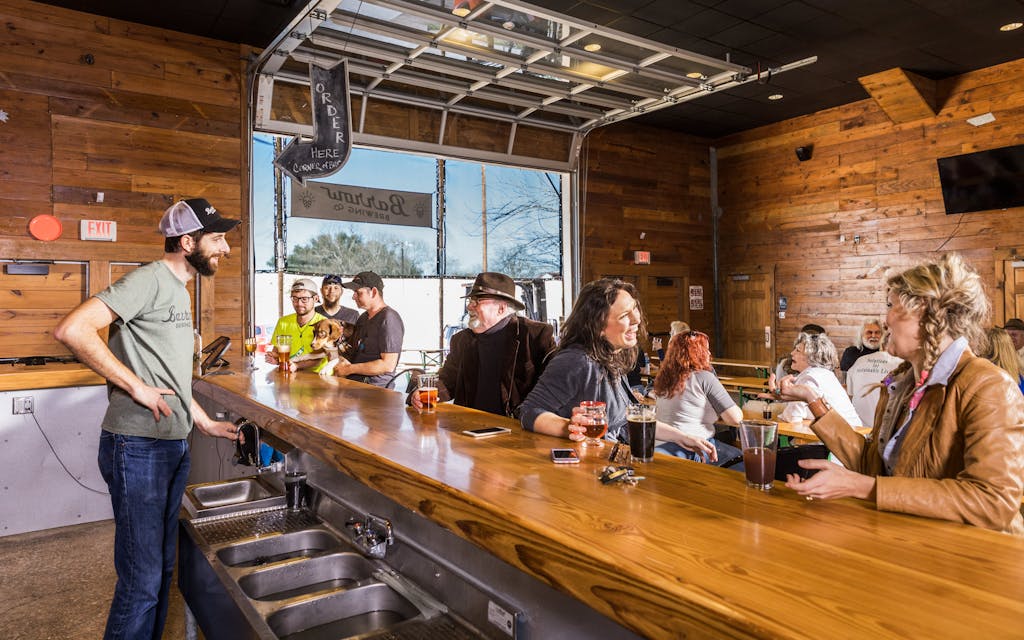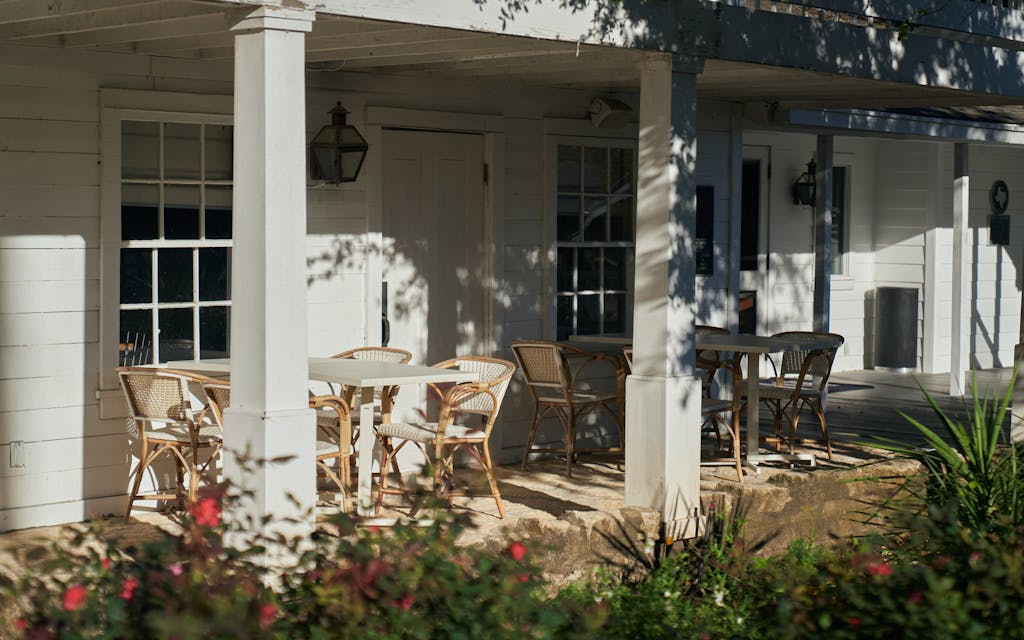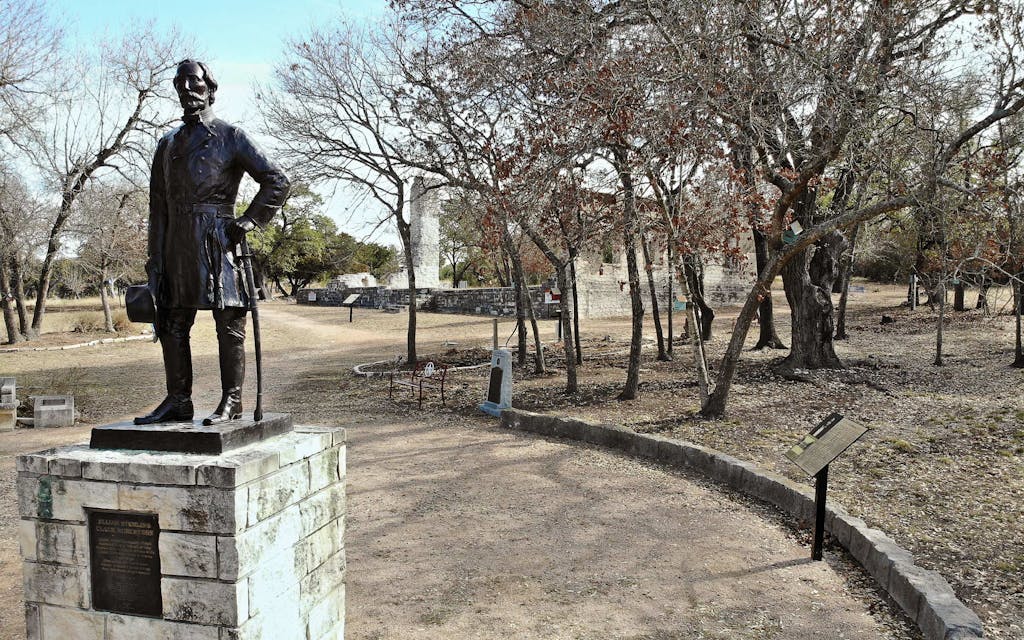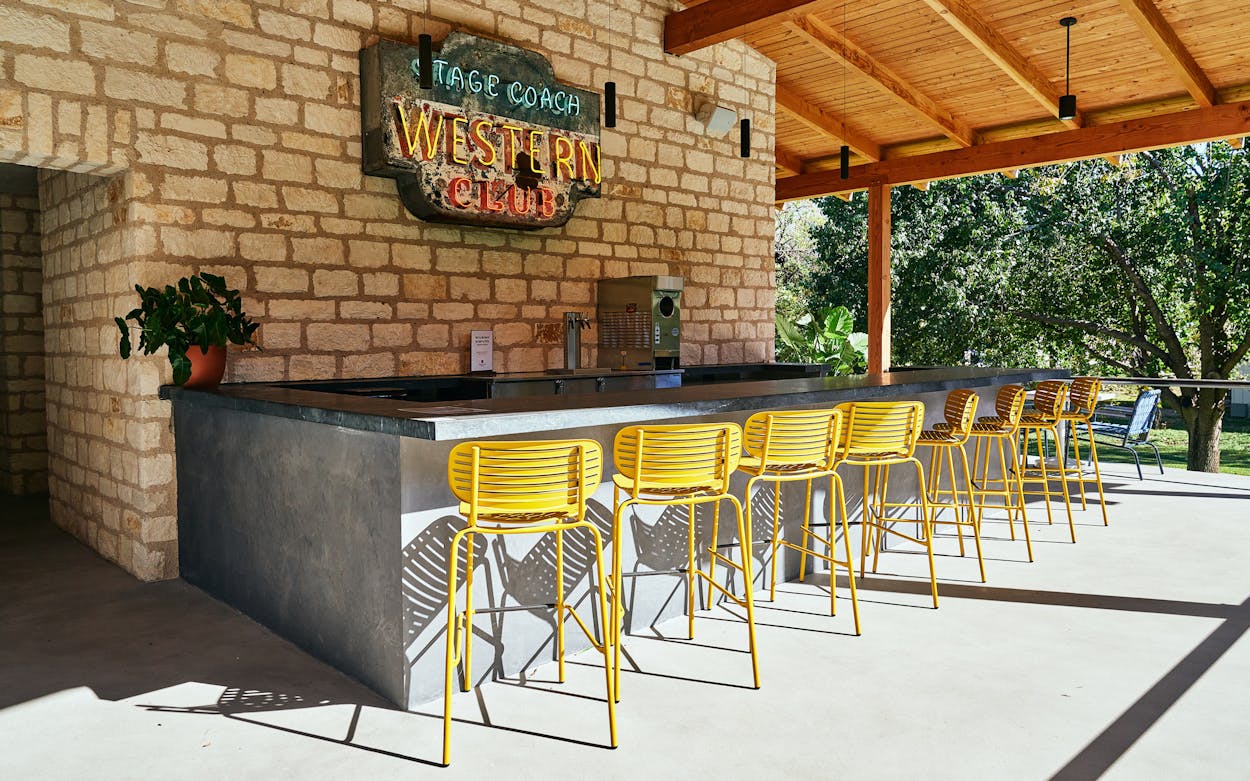In 1859, the founders of Salado, a village named for the sparkling creek that runs through it, had a radical idea: women should be educated. When they built Salado—which today lies just off Interstate 35, halfway between Austin and Waco—they also constructed a limestone school that became one of the first coed colleges in Texas. That school burned down in the 1920s, with arson suspected, yet the town’s unorthodox spirit lived on. In the sixties a few hundred artists moved in—blacksmiths, jewelry makers, painters, and potters—and the town became a colony of creatives, with some cowboys mixed in. Just over a decade later, a Jungian analyst named Harry Wilmer founded the Institute for Humanities, bringing in distinguished guest lecturers such as Maya Angelou and Barbara Jordan and deepening Salado’s identity as a hub for thinkers and makers.
Now, with the school a ruin on a hill and the institute a fond memory (Wilmer passed away in 2005, and the institute died soon after), Salado’s art scene is sharing space with a multitude of beers on tap and the drinkers who come to enjoy them. A jumbo brewery dominates the creek in the heart of town, wedding parties often take over Main Street on weekends, and there seem to be more places to get a drink than a sandwich. Salado, a fine place to sip an IPA with your toes in the creek, can sometimes feel like Central Texas’s party central.
But the artists and makers are still here, steadily working away. “There were about three hundred people in Salado when I came in the sixties, and I think we were all artists,” says Bill Smith, a master knife maker and cowboy who taught art at nearby Belton High for more than thirty years. “The artists are here; you just have to know where to look.” So while the many bars, breweries, and wineries may now draw the crowds—and no one’s mad about that—the town’s artistic current still flows.
Shop
Ro Shaw Clay Studio and Gallery
In a funky, corrugated-metal studio a short walk from the action at Salado Creek, Ro Shaw is doing his thing: throwing clay. A degreed potter and woodworker, Shaw, usually sporting clay-splattered overalls, set up shop here in 2013 and has been hosting pottery date nights and private workshops since. The self-described “only Black guy in town,” Shaw is a close reader of the town’s quirks. He has a hunch, for example, about where the ghosts tend to hang out (the basement of the historic Barton House, now an upscale restaurant). Shaw also looks out for the kids of Salado: as part of his Tiny Pots Project, he makes one-inch gnomes from scrap pieces of clay and hides them around town for the kids to find. “People come for beer,” Shaw says about the growth in visitors to Salado, “but the makers quietly do their thing, and we help each other out.”
Bill Smith Knife-Making Studio
In a 1988 article in this magazine, Salado native Liz Carpenter, the late Texas humorist and feminist, wrote of her hometown, “Salado is evidence that in even the smallest unit, the spirit can live. In a small space, a few individuals can make a stand for good.” That spirit lives on with many of Salado’s artists, but none more than Bill Smith, the master knife maker who hosts regular Tuesday night workshops for veterans (a group with which Salado, not far from Killeen’s Fort Cavazos, has a close relationship). In his backyard studio, a medieval temple of anvils and forges, Smith teaches vets the ancient alchemy of turning scrap metal into shiny, sharp knives. “I will never turn my back on these veterans,” he says. Visit by appointment only—ask for him at Chupacabra, where he often meets customers.

Bentons Jewelry Store and Gallery
There’s nothing cookie-cutter at Bentons, one of the longest-operating businesses in town. The jewelry is made by hand, the photography is developed in a darkroom, and the resident cat, who’s often found curled up in one of the jewelry cases, is named after the world’s darkest paint pigment, Vantablack. Founded by legendary local jeweler and painter Jim Benton in the 1970s, the store lives on in the hands of Bentons former apprentice Bob Hargrove, who, with his long red beard and bright blue eyes, is a wizard of lost-wax jewelry casting. “The way we make things is a one-shot deal,” says Hargrove. “If we make something, it’s the only one in the world that exists.”
FSG Fine Jewelry
Next door to Bentons, silversmith Frankie Sidaras hammers away, making her hand-forged sterling silver jewelry. With the tools of her trade—tiny anvils, scissors, and saws—arranged on a worktable in the middle of the shop, Sidaras crafts her signature hammered-silver clasps, earrings, and adornments. Customers also come for Sidaras’s pieces made with lone star blue topaz, cut by her colleague Fred Stockbauer; the gems shimmer beneath a glass case, the signature Texas star at their bright blue cores.
Fletcher’s Books & Antiques
This limestone labyrinth of a shop is a bibliophile’s promised land. Each room of secondhand books leads to another; antique tables stacked with works by authors ranging from David Sedaris to Christopher Hitchens to Hemingway make you want to drop everything and read all day. Owner Tyler Fletcher has curated a sophisticated book inventory as well as a mishmash of china, old doors and windows, and a dizzying collection of religious relics. Fletcher’s has been a Salado institution since the 1940s, when the original owner, Fletcher’s grandmother Thelma, set up shop; in the 1970s Fletcher left his life working in New York City art galleries to take up the reins. In his grandmother’s memory, Fletcher built a tiny limestone chapel in the back of the property; it alone is worthy of a visit.
Uniquely Salado Artist Cooperative
Tucked away in a cute white house off Main Street, this co-op is a compact window into the work of Salado’s painters, sculptors, and other visual artists. While it’s owned by local painter and illustrator Hollye Davis, the shop is a group project; the artists who sell their work here take turns manning the checkout counter. Look for the paintings and other creations of octogenarian and local legend Barry Starcher, a guitar maker, painter, and writer who’s been in town since the sixties, Salado’s first golden age of artists.
Eat + Drink
Chupacabra
After opening its doors in 2016, Chupacabra quickly became the locals’ bar, where committed regulars know one another so well they check in if you haven’t come around in a while. Owner Rachel Strong grew up playing hide-and-seek with her friends at her grandpa’s dance hall in Red Rock, Texas; Chupacabra is her reincarnation of that same small-town sense of belonging. If you want to catch the local artists and veterans and artist-veterans, this place is a safe bet, particularly on the afternoons when Chupacabra offers discounts on its more than four hundred wines and sixty Texas beers on tap.
Harry’s on the Creek
Harry’s is a true Texas dive bar: neon signs, cheap drinks, no fuss. The outdoor patio overlooking Salado Creek is a laid-back perch for sipping a Lone Star or a well drink in a plastic cup. The bare-bones barroom inside, adorned with a Salado Eagles flag, evokes the kind of place where you did shots in college. No fancy craft cocktails here, and that’s the way the locals like it.
Axis Winery
“I’ve traveled all over Italy drinking wines, and this Montepulciano is on point,” says a woman at the bar, swirling her glass. With some of the tastiest Texas reds around, Axis makes good wines, and the 1850s setting makes them taste even better. The winery is housed in the oldest dwelling in the area, a cabin built of oak logs fitted neatly together with thick swaths of plaster. Axis Winery owner and retired Marine Stephen Springer has taken good care to preserve this relic of Salado’s pioneer past. While sipping a good red blend, it’s fun to imagine the settlers who once carved out a life here.

Barrow Brewing Company
This microbrewery has literally taken center stage in Salado. The owners of Barrow Brewing Company built a large concrete slab by the prettiest stretch of creek for hosting concerts, farmers markets, and even live wrestling and a golf cart show (it’s legal to drive golf carts around town, as long as you stay clear of the I-35 feeders). A picnic table in the beer garden is an agreeable spot to sample beers with names like Evil Catfish and Tipsy Vicar while kids cavort on the grassy lawn and by the creek below. The warm, salty pretzels from the on-site Happy Pizza food truck pair exceptionally well with a hoppy IPA.
Muscovy Coffee Roasters
On Sunday mornings, just when you need a good cup of coffee the most, Salado’s cafes all seem to be sleeping in. That’s why everyone’s happy about the opening in late 2022 of Muscovy, a coffee shop open seven days a week. A sister business of the revered Miller’s Smokehouse in Belton, Muscovy serves chocolaty espresso and made-fresh-daily pastries straight from Momma Miller’s kitchen. The hand pies, savory empanadalike egg-and-sausage pockets, melt in your mouth like butter. Located on the northbound feeder to I-35, Muscovy is worth a stop on any road trip.
Alexander’s Craft Cocktails & Kitchen
One of the best parts about dinner at Alexander’s, the partner restaurant of Inn on the Creek and a favorite among locals, is the view. The wraparound porch overlooking Salado Creek is an inviting spot to tuck into Louisiana-style crab cakes and kung pao cauliflower. If you’re lucky, while polishing off a rich chocolate-mousse “martini,” you might see a great blue heron take flight in the glow of early evening. The restaurant’s tasty weekday prix fixe dinner menus, at $16.95 with a glass of wine, are a steal. And ask about the cozy speakeasy-style bar upstairs, an in-demand hideaway on the weekend.

Stay
The Shady Villa Hotel
The pleasures of the Shady Villa are many: fragrant star jasmine perfumes the rooms’ porches, verdant banana plants brighten the landscaping, and the pool always feels good, no matter how many bourbons you may have enjoyed at the guests- and members-only Bourbon Club on the upper balcony. Since the Bunkhouse takeover from La Corsha in 2021, the property bears the cool touches one might expect of a Bunkhouse property: mid-century modern Nelson bubble lamps; hip, large-scale photographs of Texas landscapes; and an appreciation for canine travelers (my Labrador loves his powder-blue tennis ball emblazoned with the Bunkhouse logo). While reclining on one of the pool’s blue lounge chairs or at the hotel bar nearby, even the hum of traffic on I-35 can feel relaxing.
Inn on the Creek
Perhaps one of the prettiest sights in Salado is the row of white Adirondack chairs on the lush, green creekside lawn of this old-school Victorian bed and breakfast. With the clear, flowing water within reach and hammocks available for some real repose, Inn on the Creek is a quiet alternative to the weekend buzz around the Main Street watering holes. The twenty-room inn offers guests easy-access luxuries at its nearby spa and two restaurants, the Shed and Alexander’s.

See + Do
Old Salado College
This cedar-filled hill topped with the limestone ruins of the old Salado College offers paths for strolling and benches for contemplating. There is much to contemplate here. For example, why would a limestone school burn down three times? A plaque reminds visitors that Salado is the hometown of the late, great Liz Carpenter, a feminist writer who worked in the LBJ White House. Nearby stands a dashing statue of her mustachioed great-grandfather, Colonel Elijah Sterling Clack Robertson, the Spanish-speaking Texas pioneer who, in 1859, founded both Salado and the school that once thrived here.
Robertson’s efforts on behalf of women’s education were forward-thinking; his signing of Texas’s secession ordinance from the Union and his ownership of enslaved people, however, were not. The Robertson plantation, located on the other side of I-35 and still owned by his descendants, is home to a long block of limestone slave quarters. While the sign by his statue’s side may get some things right, its classification of that limestone building as “servants quarters” is not one of them. If you look closely, you’ll see that somebody, perhaps wanting the plaque to tell it like it is, has scratched the word “servants” out.
Ashai Health
If all the adult beverages in town leave you feeling fuzzy, there is a remedy: freeze your buns in a subzero cryotherapy chamber at Ashai. This wellness center, a refreshing new business in town, can turn postparty blues around with cryotherapy, IV drips, red-light therapy, and other recovery treatments. The attentive owners are a healthy, knowledgeable crew; one is a nurse practitioner at Fort Hood and another owns TrueHarvest, an organic lettuce farm in Belton.
- More About:
- Salado






